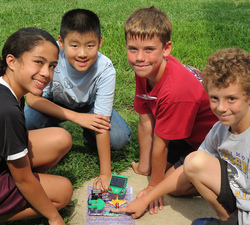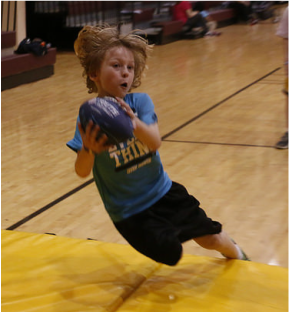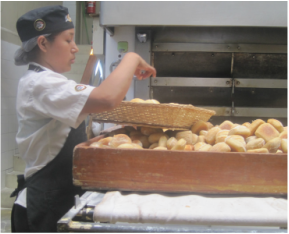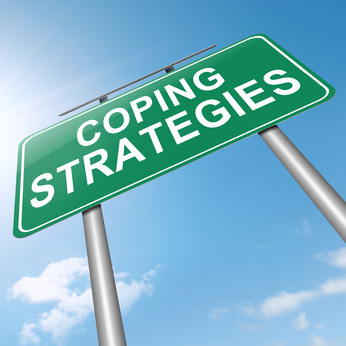
As Brad and Ashley, the morning show team, learned, for a surprising number of parents, being a hovering helicopter isn't enough. They feel a strong need to clear the path so their kids experience no failures, no boo-boos, no disappointments and not even "close calls". Oh my. This isn't going to end well, now is it?

These parents have negative reputations with others. They are emotionally-driven and oftentimes, unreasonable. Other adults isolate them which only intensifies their behavior. They micro-manage nearly every aspect of their children's lives. It's very unhealthy all around.
This overbearing style is a reflection of parents' anxiety and perhaps, their inability to help their children cope with those disappointing life events. This suggests to me that parents have limited coping skills to manage their own lives. They have serious difficulty tolerating ambiguous events and seek to control as much as they possibly can in order to reduce their anxiety. Does the phrase "control freak" mean anything to you? This micromanaging style helps to "bind their anxiety" to a tolerable level.

But, before moving forward, "What is a coping strategy/skill?" Coping skills are those activities, both cognitive and physical, that you use to manage stress. Developing and practicing effective coping skills makes it easier to cope with stress over time because "you get good at what you practice"!
- Taking a bath (increases core body temperature and induces relaxation)
- Taking a walk
- Play a game
- Find a new place to explore
- Take a bike ride
- Go to a park
- Buy some flowers
- Call a friend
- Sit under a tree and look up
- Deeply breathe
- Stretch your muscles, slowly
- Take a nap
- Watch the clouds
- Write a letter
- Go to the library or museum
- Call a friend
- Put on some music
- Organize whatever is messy
- Pick up trash in the park
- Build a pillow fort
- Cook...make pudding or cookies or anything yummy
- Cry
- Dance
- Work a crossword, dot-to-dot
- Color
- Get a massage or mani-pedi
- Rub on some great smelling lotions
- Light a soothing candle
- Do something for someone else
- Scream, shout, let it all out
In terms of developing "world views", go to "what you know for sure". Here are some that I find meaningful:
- Good times end and so do the bad ones. It's a cycle. Ride it out.
- Sometimes you're the windshield and sometimes, you're the bug. Everybody has tough times. I'm no different. What is different is how I choose to look at it and how I handle it.
- I am going to problem solve this. I'm not going to get emotionally involved. I'm going to use my mind to achieve an outcome that minimizes damage to me and those I love.
- Is this person really worth it? Do I really benefit from this relationship? Is it supportive and healthy? Has it run its course and now, it's time to move on to a better life?
- I'm so glad I'm not them. I'm glad I don't act like that. Whatever is happening to them, I'm letting them go on their way. I'm not going to react or retaliate. It never comes to any good. Think road rage. Yeah, that usually turns out well. Let them get ahead of you. Let them honk and scream and flip you off. Oh well.
- I don't take life personally. People act out. It's not about you, but about them and their issues. You're collateral. Walk away. My motto is "Next"!
- Will I remember this in a year? 2, 3...on my death bed? Move on.
- It is what it is. You are likely to not be able to change anything, only how you feel about it and respond to it. I was impressed by the character in Armageddon played by Steve Buscemi who said, "Embrace the horror". He accepted what was happening and decided to appreciate it. Look further into the event. What have you learned about others, about yourself? What will you do differently the next time. No pain, no gain is not just about exercise.
- Life is a puzzle. We're handed small pieces at a time and frequently, don't see the "whole picture" and what it may mean for us. Don't get overly involved in the "pieces". Understand that the whole picture may not evolve in a meaningful way until years later. Just hold the piece and trust that it means something.
- Everything happens in your best interest. In my own life, I've had trouble justifying some of these because they made no sense. Cruel, brutal, senseless. How can anyone make sense of that stuff? In one case, it took science nearly 20 years to help me understand the "why" behind the "what". You never know where the understanding will come from and many of us will pass away before we know. We just need to trust.
And, speaking of trust. Trust your kids. Most kids don't get hurt. Most kids don't get sick. Most kids are OK. If they're not. Problem solve, cope, pass along what you've learned to others. Whatever your beliefs and "knowings" are, your love and memories will sustain you if your losses are great.
I stood at the end of our sidewalk and watched as our son drove his car away, alone, for the first time when he was 16. He was on his way to high school. He was a junior and younger than the other kids. I usually didn't worry about him. But on this day, I was faltering. My husband retrieved me about 10 minutes later. Apparently, he had been watching from the kitchen window and saw me outside, talking to myself. I was saying, "Most kids don't get hurt. Most kids drive and survive" over and over. I'm happy to say that our son is still safe and sound.
Through triumph and tragedy, just like the rest of you, I use my coping skills effectively and some days, not so much. I just keep practicing.
If you suspect you are a helicopter/lawnmower parent, talk to your spouse, your most trusted friend (not the "everything is OK friend", but the one with the courage to tell you the truth), take a good long look at yourself as you move throughout your day. Check in on your anxiety and the thoughts that go with them. Get some support and guidance. Don't let your anxiety and insecurities slop over onto your kids. It's too high of a price to pay.
TTFN, Claudia



